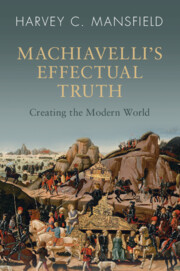‘Mansfield has a signature way of reading and writing, which is on full display in Machiavelli’s Effectual Truth. As a reader, he is not afraid to make bold conjectures about arguments, suggestions, and intentions that an author does not state plainly but conveys between the lines of his text. As a writer, he blends simplicity and subtle sophistication. Mansfield is a master at using simple, unpretentious words in phrases that are more artful and telling than they first appear.’
Devin Stauffer - Professor of Government, The University of Texas at Austin
‘The scholar is suspicious, attentive, sharp. The writer, austere, stingy, and often funny in his many polemical puns. Reading Harvey Mansfield has always been a first-class intellectual experience, but Machiavelli’s Effectual Truth offers the pleasure of a true tour de force: not just a highly original family tree of The Prince and the Discourses on Livy’s political realism, from Machiavelli to Montesquieu and Tocqueville, but an existential inquiry into what it means to create, to hand down, and to inherit in the world of ideas - as much today as in the past.’
Gabriele Pedullà - Professor of Italian Literature and Comparative Literature, University of Roma Tre, author of Machiavelli in Tumult
‘Having long reigned as the foremost interpreter of Machiavelli’s thought, Harvey Mansfield offers a provocative examination of Machiavelli’s significant, but overlooked, term- ‘the effectual truth.’ Mansfield finds monumental significance in Machiavelli’s neologism, which shaped the history of modern political philosophy and hence our contemporary world. This is a challenging work, full of insight as well as wry humor that demands - but also rewards - reflection.’
Vickie B. Sullivan - Cornelia M. Jackson Professor of Political Science, Tufts University
‘Mansfield's knowledge of Machiavelli's writings is encyclopedic and his scholarship is admirable … Recommended.’
B. T. Harding
Source: CHOICE
‘There is a great deal of humor in this book, most of it wry. Mansfield’s jokes are veiled partly in order to preserve the outward dignity of academic convention but also, I venture, to make the reader work to find them. Once one realizes this, it makes sense to apply to him the same judgment he once applied to Machiavelli: no paragraph of Mansfield’s has been understood until you have found something funny in it. If you are not in more or less constant amusement when reading him, you should consider yourself bewildered.’
Michael Anton
Source: Claremont Review of Books



